语法学案情态动词Modal Verbs课件
- 格式:doc
- 大小:96.00 KB
- 文档页数:11
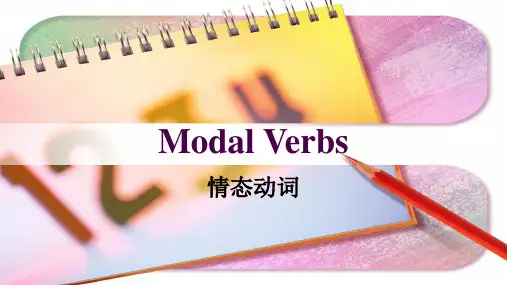
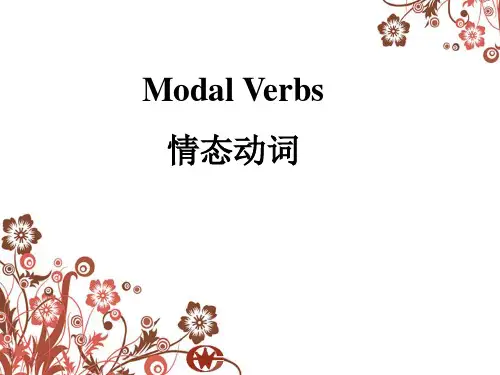
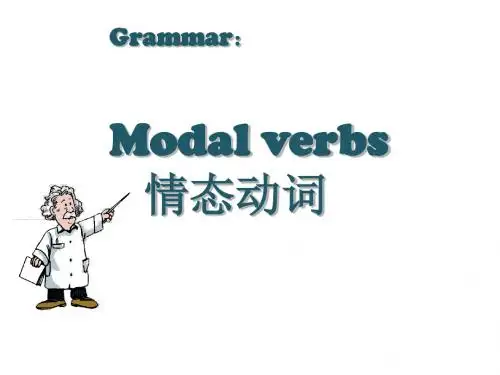
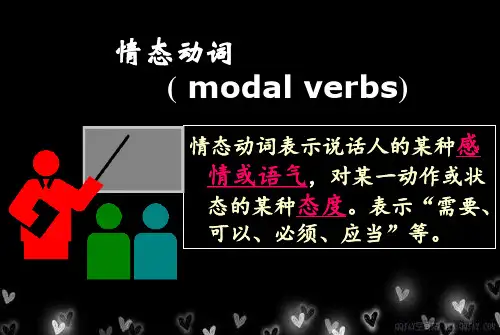
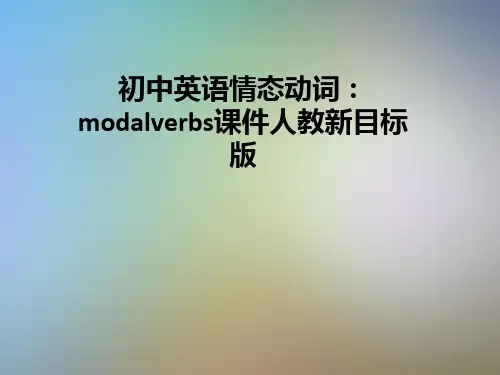
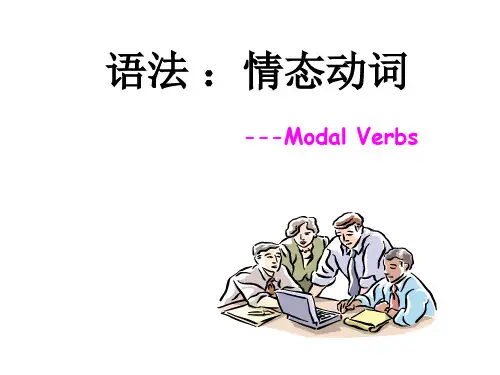
](https://uimg.taocdn.com/b56df0754b73f242336c5f6b.webp)
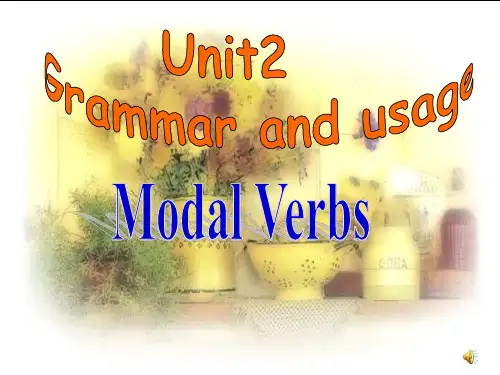

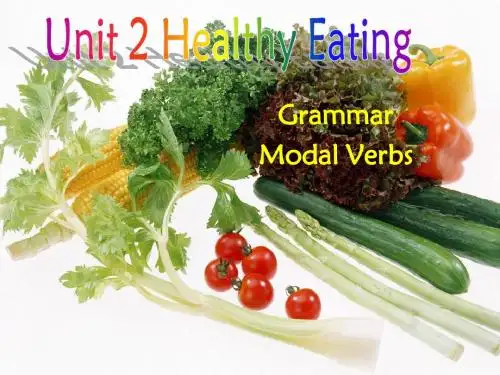
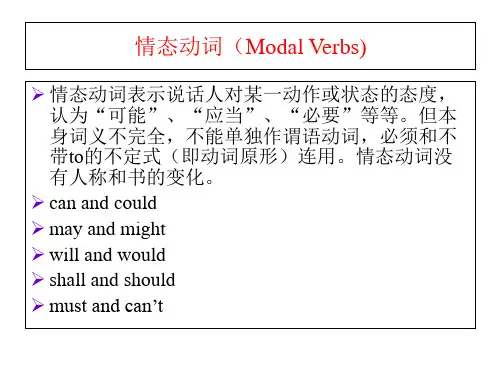
语法学案5:情态动词(Modal Verbs)助动词(auxiliary)主要有两类:基本助动词(primary auxiliary)和情态助动词(modal auxiliary)。
基本助动词有三个:do, have和be;情态助动词有十三个:may, might; can, could; will, would; shall, should; must, need, dare, used to, ought to. 上述两类助动词的共同特征是,在协助主动词构成限定动词词组时,具有作用词的功能:1)构成否定式:He didn’t go and neither did she.The meeting might not start until 5 o’clock.2)构成疑问式或附加疑问式:Must you leave right now? You have been learning French for 5 years, haven’t you?3)构成修辞倒装:Nowhere can he obtain any information about his sister. Hardly had he arrived when she started complaining.4)代替限定动词词组:A: Who can solve this crossword puzzle?B: Tom can.B: Yes, do.语气和态度。
1. 后面一般+动词原形2. 一般没有人称和数的变化即第三人称单数不加-s3. 一般只有现在式和过去式两种形式,但可以表示现在时间,过去时间和将来时间。
4. 情态动词没有非谓语形式,即没有to do, doing, done等形式现代英语语法还将be able to(能够), had better(最好), would rather(宁愿),used to(过去常常)等列为情态动词。
He is at home. (事实)He must be at home.(非常肯定的推断)He could be at home.(很可能)He may be at home.(仅仅可能而已)He might be at home.(或许, 非常不确定)He might not be at home.(也许不在家)He may not be at home. (比might 可能)He couldn’t be at home.(很可能不在家)He can’t be at home.(一定不在家)must + do(be)是推测现在存在的一般状态进行;must + be doing 推测可能正在进行的事情;must +have done 是推测可能已经发生过的事情。
could 表示可疑的可能性,不及can’t 语气强,用于肯定、否定、疑问句中。
The weather in that city could be cold now.We could have walked there; it was so near.(推测某事本来可能发生,但实际上没有发生)Can he be in the office now? No, he can’t be there, for I saw him in the library just now.(语气很强,常用于疑问句和否定句中),后者语气弱,更没有把握。
可用于肯定句和否定句。
1) 表示可能性(possibility ),用于对现在,过去或将来的推测,暗示不确定。
might 不是may 的过去式,它所表示的可能性比may 小,含较多的怀疑。
He may be very busy now. (可能性较大) He might be very busy now. (可能性较小)He may go now. We may keep the book for two weeks.3)用于祈使句,表示祝愿。
May you succeed! May you have a nice trip!III. 情态动词注意点:“能够”。
can表“能够”can同义,be able to可以表达“某事终于成功”,而can无法表达此意。
be able to可用于各种时态,强调通过努力克服困难成功地做成某事,相当于managed to do 或succeeded in doing。
My grandma is over eighty, but she can/is able to read without glasses.We can/ will be able to talk about the matter later.can (could)表示许可、允许,在疑问句中表示“请求,许可”,否定句中表示“不许”,此时可与may通用,有时cannot可以表示“禁止”,相当于“mustn’t”。
can (could)表示推测,强调客观可能性“可能、会”,can多用于疑问句和否定句,表示猜测时,情态动词后可用进行式或完成式。
could表示“能力”“可能性”“许可”,为can的过去式。
一般用于委婉、客气地提出问题或陈述看法,此时can,could并没有时间上的差别,只是could的语气更委婉些。
回答时用can回答。
Liz, can you do me a favor?Excuse me, could you tell me the way to the station?I wonder if you could help me. (request请求)-- Could I use your phone? --Yes, of course. You can.Do you think I could borrow your bike. (permission许可)*需要注意的几点:表示猜测,can一般不用于肯定句中,除非是“经验之谈” 。
这时can可以表示客观的可能性,并不牵涉具体的事情是否会发生;要表示某事发生的可能性别时需要用could,may,might。
Children can often get ill suddenly.(小孩常常可能突然生病)Certain things in the home can be dangerous,especially if you have young children.(家里的某些东西可能有危险,尤其是有小孩的时候。
)上面两句可以看作医务工作者或抚养过孩子的人说的话,属“经验之谈”。
Accidents can happen on such rainy days.有“可以”的意思,询问一件事可不可以做,有时可以与can互换。
其否定式may not 表示“不可以、禁止、阻止”等,常用must not=mustn’t代替,may用于疑问句中,回答这种问题时,多避免用may,而用其他形式,以免显得口气太严峻或不客气。
表推测、或许、可能的意思,表示一件事或许会发生,只用在陈述句中。
表祝愿: May you succeed! = I hope you may succeed. May you be happy, healthy and wealthy!might是may的过去式,表示可以做的事或可能发生的事;主句谓语动词是过去时态时用might不用may。
的口气委婉,或表示现实的可能性更小一些的语境中。
“必须“,否定式mustn’t表示“不应该,不许可,禁止”等。
因此,在回答带有must的问句时,不用mustn’t,而用needn’t或don’t have to.must在表示“必须”时与have to相近,have to比较强调客观的需要,must着重主观看法。
另外must不像have to那样能有更多的时态。
表推测,暗含很大的可能性,意为“一定”,只用于“肯定句”中。
偏偏、硬要、干嘛(指做令人不快的事)。
如:Hey.boys!Must you shout so loudly?must与have to都可以表示“必须”的意思,但要注意以下两点区别。
1) must只有现在时,而have to有现在时、过去时和将来时。
如:We must work hard, or we’ll fail in the examination.Years ago, the poor girl had to leave school for lack of money.2) must表示主观看法,have to则侧重于客观需要。
如:We must be strict with ourselves in everything.In cities with many cars, some people have to wear masks.Shall she go to the concert with us this evening﹖(征求意见)You shall go to the front at once.(命令)Don’t worry.You shall get the answer this very afternoon.(允诺)He shall be sorry one day.I tell you.(警告)Nothing shall stop us from fighting against pollution.(决心)用于二、三人称陈述句中。
表示说话人给对方的命令、许诺、警告、强制、威胁、决心等。
在疑问句中,表示征询听话人是否愿意。
You shall fail if you don’t work harder. (警告)He shall have the book when I finish reading it.(允诺)He shall be punished.(威胁)用于一、三人称的疑问句中,表示说话人征求对方的意见和向对方请示。
Shall we put off the sports meeting until next month?Shall Tom go there with me tomorrow?“应当”讲,与ought to更注重一些责任义务。
should表示预测可能性,并译作“可能,(按道理)应该”;而ought协则表示非常可能。
should用于委婉、谦逊地提出意见或建议,ought to可表示因责任、义务等该做的事。
a. should 表示劝告、建议、命令。
You should go to class right away.b. should 表示期待,用于表达合理推断(prediction,意为“应该”),或明显的结果(意为“可能”)且所期待的事几乎是事实。